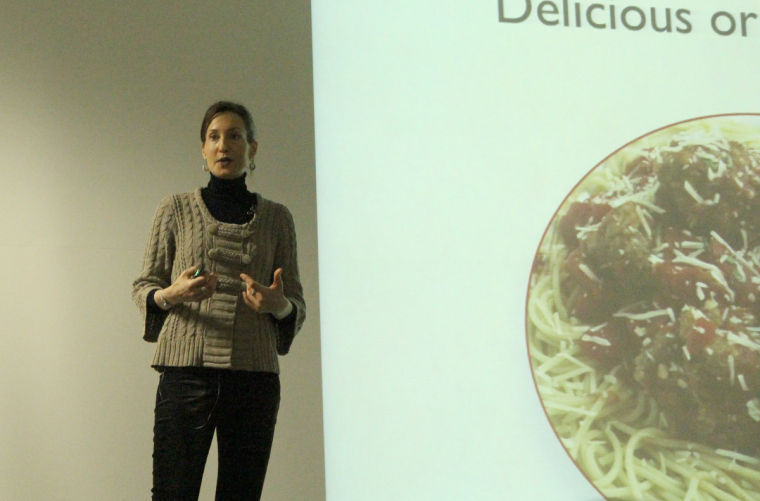Award-winning author lectures students on carnism
Melanie Joy, Harvard graduate and University of Massachusetts professor of psychology and sociology, gives a presentation about Carnism on Sunday evening in Wirtz Hall. Carnism she explains, is the belief system that influences people to consume meat. Joy’s lectured on the occasion of Earth Day.
April 21, 2013
In honor of Earth Day, author and psychologist Melanie Joy gave a free lecture Sunday night based on her award-winning book “Why We Love Dogs, Eat Pigs, and Wear Cows: An Introduction to Carnism.”
Joy focused on the concept of carnism, which she said is an invisible belief system that determines the way humans perceive the meat they eat.
“When it comes to eating animals, our perception is changed by our culture,” Joy said. “Members of a culture tend to find their culture rational, but other cultures irrational or disgusting.”
Joy said eating meat is often seen as a given, not a choice. Members of a culture do not often acknowledge the natural connection that exists between a human and an animal. She said humans have to block their awareness of this reality and shut off their empathy to eat meat.
“Without awareness, there is no free choice,” she said. “No one ever asked if I wanted to eat an animal, or if I liked eating animals. Our food choices have such a significant impact over our bodies, our minds, and the world.”
Some students, like junior nursing major Marquayle Carver, consider themselves aware.
“I’ve watched food documentaries before, and I understand that animals are treated poorly,” Carver said. “They should be treated more humanely, but I’ll still always eat meat.”
Freshman communications major Devon Jackson also enjoys the lifestyle of an omnivore.
“When it comes down to it, eating meat is in a person’s lifestyle. It’s the American way,” Jackson said. “I see the healthy benefits to vegetable-based diets, but there are things in meat you just can’t get from plants.”
Joy said she hopes to spread awareness so her listeners will choose to actively show their opinion, instead of standing by and considering meat as a given, not a choice.







